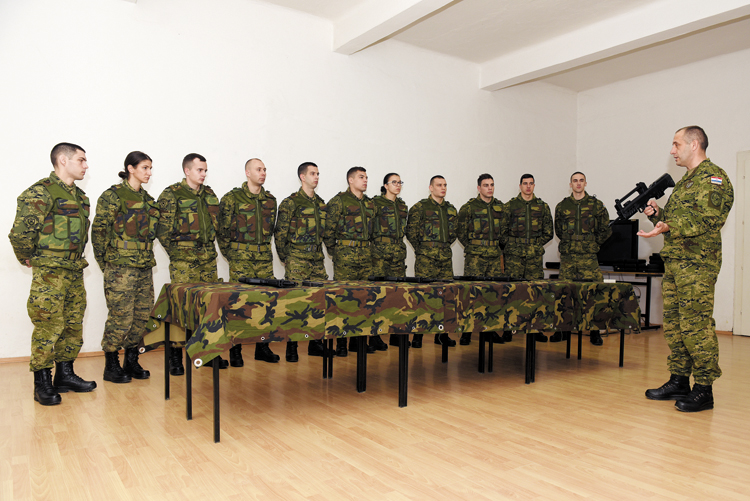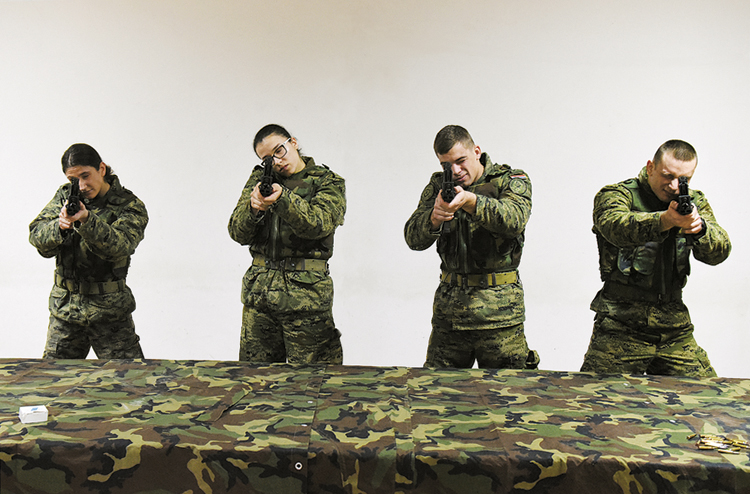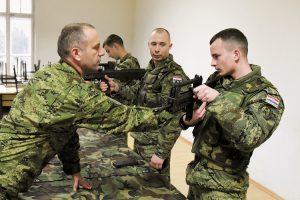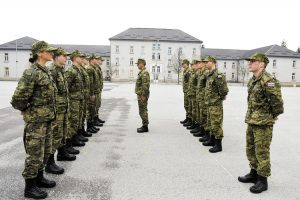In late September and early October 2017 the Special MP Company of the MP Regient…
New Generation of Top Athletes at Military Training
 The previous year in the Croatian Armed Forces was marked by sport. Numerous competitions and sports activities were organized in the Year of Readiness and Activity of the Croatian Soldier with the objective of popularizing physical activities. But, the Croatian Armed Forces also cheered our athletes on in international competitions and supported the development of civilian sports in 2018. However, we ought not forget that the Croatian Armed Forces did not start supporting sports only last year. Sports and military have been linked to one another for a long time.
The previous year in the Croatian Armed Forces was marked by sport. Numerous competitions and sports activities were organized in the Year of Readiness and Activity of the Croatian Soldier with the objective of popularizing physical activities. But, the Croatian Armed Forces also cheered our athletes on in international competitions and supported the development of civilian sports in 2018. However, we ought not forget that the Croatian Armed Forces did not start supporting sports only last year. Sports and military have been linked to one another for a long time.
The link was established on 3rd September 2010, when the Croatian Olympic Committee and the Ministry of Defence signed the Agreement on Co-operation, Promotion and Development of Sport in the Republic of Croatia, which allowed a group of top athletes to enter active duty. The new Agreement was signed on 27th February 2015. Since then, top athletes have entered the contract reserve after finishing their military training.
The current programme works in such a way that athletes’ clubs and leagues suggest candidates to the Croatian Olympic Committee, which in turn chooses those athletes for military training who have top-level results and are involved in one of the sports on the International Military Sports Council’s list. If the Ministry of Defence establishes that the nominated athletes fulfil all legal requirements to enter the training, the candidates have to pass a medical examination and preliminary security vetting.
In mid-January, the 6th generation of top athletes entered military training at the Barracks “123rd Brigade of the Croatian Armed Forces” in Požega. Most of them are involved in combat sports such as taekwondo, judo, boxing, wrestling and karate, but there are representatives of other sports (e.g. gymnastics and shooting sports), as well. A common trait for all of them is the feeling of pride for taking part in the training. “It is a great honour to serve my country in the contract reserve. I am extremely happy to be here,” says Ivan Kvesić, the runner-up in the latest European Karate Championship and the current world karate champion in the kumite 84 kg category. He follows in the footsteps of his brother Anđelo, who is also a contract reservist.
Iva Radoš, the bronze medalist at the European and World Taekwondo Championships in 2018, also has a family connection to the army: her two uncles, from whom she has learnt that there is no greater honour than serving one’s country. On the other hand, her colleague Kristian Tomić has always been interested in the military, so joining the contract reserve is a dream come true for her. “I was happy and excited when I learnt that I would take part in the training because I love challenges and opportunities to acquire new knowledge,” Kristina Tomić, the current European taekwondo champion in the 49 kg division, tells us.
 The training of the sixth generation is eight weeks long and is conducted in two phases. The first phase began on 14th January, when eleven athletes started their training at the Basic Training Centre of the Training and Doctrine Command “Fran Krsto Frankopan” in Požega. The phase is 12 days long and ends with an oath-taking ceremony. During the first phase, the athletes’ working day begins at 6 a.m. and ends at 6 p.m. In those 12 hours, they go through training in various fields such as handling sidearms (the VHS-1 rifle and a pistol); tactical movement; reaction to contact, indirect fire and nuclear, biological and chemical threats; target practice with an AK-47 rifle, etc. When the working day is over, the conscripts do not rest. Rather, they train at the gym or adequate sports facilities in Požega until 10 p.m. Although they are dislocated from their everyday life, these athletes know that their opponents are not resting, so they cannot afford to neglect their training. We ask Iva Radoš if she finds the life in the barracks strenuous. With a smile, she replies: “It is a bit strenuous and we do get tired, but we are used to it. This is how we live.”
The training of the sixth generation is eight weeks long and is conducted in two phases. The first phase began on 14th January, when eleven athletes started their training at the Basic Training Centre of the Training and Doctrine Command “Fran Krsto Frankopan” in Požega. The phase is 12 days long and ends with an oath-taking ceremony. During the first phase, the athletes’ working day begins at 6 a.m. and ends at 6 p.m. In those 12 hours, they go through training in various fields such as handling sidearms (the VHS-1 rifle and a pistol); tactical movement; reaction to contact, indirect fire and nuclear, biological and chemical threats; target practice with an AK-47 rifle, etc. When the working day is over, the conscripts do not rest. Rather, they train at the gym or adequate sports facilities in Požega until 10 p.m. Although they are dislocated from their everyday life, these athletes know that their opponents are not resting, so they cannot afford to neglect their training. We ask Iva Radoš if she finds the life in the barracks strenuous. With a smile, she replies: “It is a bit strenuous and we do get tired, but we are used to it. This is how we live.”
During the second phase, which is six weeks long, athletes train in their clubs and take part in competitions. Although the training in barracks is condensed because of the athletes’ sports commitments, their instructors guarantee that they acquire the same amount of knowledge as all other conscripts. “Regardless of the duration, athletes perform all key tasks from the basic military training programme,” the Deputy Commander of the Basic Training Centre Lieutenant Colonel Ivica Markanjević and the Commander of the 1st Training Company Captain Mato Troha explain. They point out that the athletes’ top-level results help them perform physically demanding tasks faster than other conscripts.
 The athletes themselves agree that sport is a good foundation for military training. “All of us have well-developed motor skills, which has helped us in the training,” Ivan Kvesić thinks. Robert Seligman, the bronze medalist at the European Gymnastics Championship in pommel horse, believes that the fact that athletes are used to discipline and order is an advantage for them. “We have no problem listening to and obeying orders. Our relationship with the commanders is similar to the one that we have with our coaches in our clubs,” Seligman concludes.
The athletes themselves agree that sport is a good foundation for military training. “All of us have well-developed motor skills, which has helped us in the training,” Ivan Kvesić thinks. Robert Seligman, the bronze medalist at the European Gymnastics Championship in pommel horse, believes that the fact that athletes are used to discipline and order is an advantage for them. “We have no problem listening to and obeying orders. Our relationship with the commanders is similar to the one that we have with our coaches in our clubs,” Seligman concludes.
Indeed, the entire staff at the barracks in Požega has nothing but praise for this generation. “They distinguish themselves with a serious approach to work, which contributes to the success of their training. Their behaviour and the responsibility with which they carry out their tasks are as top-notch as their results in sports,” Lieutenant Colonel Markanjević and Captain Troha say with pleasure. The athletes also praise their instructors. Robert Seligman says: “The commanders treat us well. We are having a great time and fell well here.”
 Once they are disbanded, the sixth generation will sign a contract with the Ministry of Defence and joined about 30 other top athletes who are already in the contract reserve. As reservists, they will receive a monthly pay and have covered health insurance. In exchange for those rights, they have to fulfil some obligations. Among other things, they must wear insignia of the Ministry of Defence and the Croatian Armed Forces on their kits during competitions, respond to invitations to training and military exercises, maintain the level of physical fitness needed for top-level results and participate in the making of promotional materials for the Croatian Armed Forces. The last item on the list may seem more fit for models than athletes, but Lieutenant Colonel Markanjević and Captain Troha assure us that this task is extremely important for athletes in the reserve, for they bear the responsibility to uphold the good reputation of the Croatian Armed Forces at home and abroad with their behaviour: “The Ministry of Defence promotes a healthy approach to life that includes a lot of physical activity and top athletes are a part of the campaign aimed at popularizing such a lifestyle. Their youth and the energy that they invest in sports are an example and a source of motivation to young people when choosing the military calling.”
Once they are disbanded, the sixth generation will sign a contract with the Ministry of Defence and joined about 30 other top athletes who are already in the contract reserve. As reservists, they will receive a monthly pay and have covered health insurance. In exchange for those rights, they have to fulfil some obligations. Among other things, they must wear insignia of the Ministry of Defence and the Croatian Armed Forces on their kits during competitions, respond to invitations to training and military exercises, maintain the level of physical fitness needed for top-level results and participate in the making of promotional materials for the Croatian Armed Forces. The last item on the list may seem more fit for models than athletes, but Lieutenant Colonel Markanjević and Captain Troha assure us that this task is extremely important for athletes in the reserve, for they bear the responsibility to uphold the good reputation of the Croatian Armed Forces at home and abroad with their behaviour: “The Ministry of Defence promotes a healthy approach to life that includes a lot of physical activity and top athletes are a part of the campaign aimed at popularizing such a lifestyle. Their youth and the energy that they invest in sports are an example and a source of motivation to young people when choosing the military calling.”
Between exercises, some of the athletes told us that they would like to continue serving their homeland and possibly enter active duty once their sports careers are over. However, that decision will have to wait. First, they need to enter a lot of championships and tournaments so that they could make their biggest wish come true and qualify for the 2020 Olympic Games. Three years ago, 17 athletes in the reserve qualified for the Olympics in Rio de Janeiro and seven of them won medals. The new generation of athletes in the reserve has to equal that success or even surpass it. Having met them and having seen how easily they overcome challenges, we have no doubt they will make it to Tokyo next year and make us proud.
Sports and Military in Partner Countries’ Armed Forces
The armed forces of partner countries in NATO and the European Union support the development of sports. We bring some examples.
United States of America
In the United States Armed Forces, active and reserve soldiers may apply for the U.S. Army World Class Athlete Program, a unit that allows soldiers to simultaneously work in the army and train for sports competitions and Olympic qualifications. In order to be selected for the unit, a soldier must have the status of a high-ranking athlete, must have completed Advanced Individual Training or Officer Basic Course and must have the intention to apply for the Olympic Games. Some of the sports that U.S. soldiers in WCAP are involved in are athletics, bobsleigh, luge, wrestling, shooting sports and biathlon.
Germany
In Germany, athletes may enter military training, after which they sign a contract with the Bundeswehr, acquire the status of a Sportsoldat and receive a monthly pay. However, their training is much shorter than that of non-athletes and they are exempt from participating in military exercises so long as they are actively involved in sports. Once their sports career is over, they may enter active duty and continue working in the Bundeswehr as NCOs or (rarely) officers. They are involved in both winter (biathlon, Nordic combination, cross-country skiing and bobsleigh) and summer sports (diving, athletics, wrestling).
Austria
The Austrian Armed Forces also support their top athletes. The athletes receive a pay and their health and social insurance are covered during their sports careers. Once they retire from sports, they may enter active duty. Since 1997, the Bundesheer has sponsored the careers of 450 athletes. Currently, the Austrian Armed Forces support 150 athletes, which is more than a half of all Austrian Olympians. They compete in shooting sports, judo, athletics, swimming, skiing, Nordic combination and biathlon.
Italy
In the Italian Armed Forces, each branch has its sports section and their members are involved in sports such as athletics, equestrianism, swimming, diving, rowing, skiing and biathlon. Some of the most famous athletes from the Italian Armed Forces are skiers Alberto Tomba and Giuliano Razzoli, the latter of whom won the Snow Queen Trophy in Zagreb in 2010.
Text by IVA GUGO
Photo by MLADEN ČOBANOVIĆ
Translation by IVA GUGO
